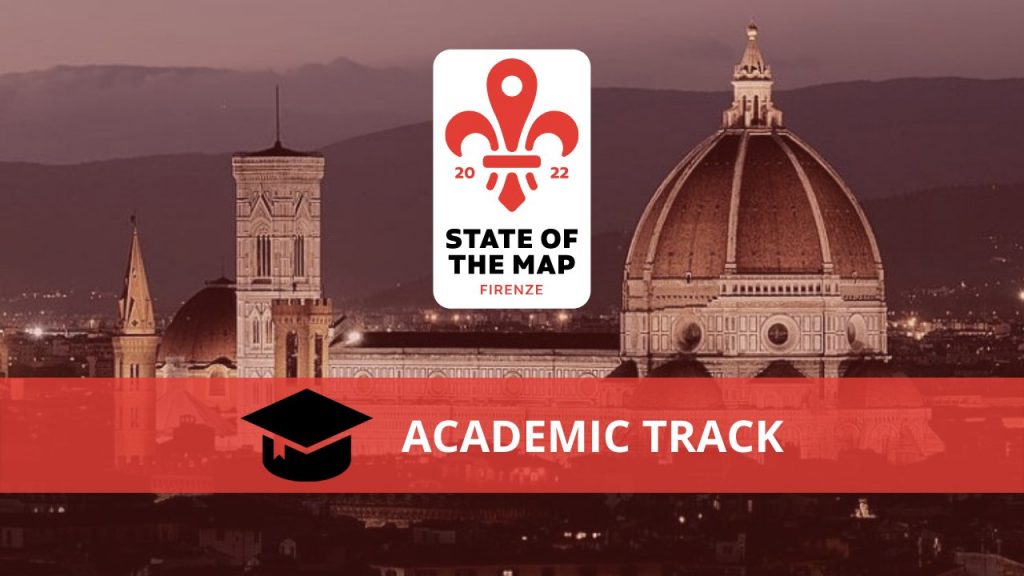
This year’s State of the Map conference, a hybrid conference taking place in Florence and online simultaneously, will feature the fifth edition of the Academic Track – a full day of sessions dedicated to academic research about, and with, OpenStreetMap (see the last year’s Academic Track). The goal of the Track is to showcase the research and innovation of scientific investigations into OpenStreetMap, while at the same time providing a bridge to connect members of the OpenStreetMap community and the academic community through an open passage to exchange ideas and opportunities for increased collaboration. We expect empirical, methodological, conceptual, or literature-review-based contributions addressing any scientific aspect related to OpenStreetMap, in particular, but not limited to, the following:
- Extrinsic or intrinsic quality assessment of OpenStreetMap data
- Analysis of contribution patterns in OpenStreetMap
- Generation of new and scientifically valuable datasets from OpenStreetMap
- Assessments of data import procedures and their impacts on data and community
- Integration between OpenStreetMap and other data sources (authoritative, user-generated, or otherwise valuable to OpenStreetMap)
- Analysis/comparison of available software for scientific purposes related to OpenStreetMap
- Novel approaches to facilitate or improve data collection and/or data quality in OpenStreetMap (e.g. through gamification or citizen science approaches)
- Artificial Intelligence / Machine Learning from, and with OpenStreetMap (e.g. AI-assisted mapping)
- Open research problems in OpenStreetMap and challenges for the scientific community
- Cultural, political, and organizational aspects of data production and usage practices in OpenStreetMap
- Studies using OpenStreetMap data in scientific domains
- Reviews of any scientific aspect connected to OpenStreetMap
In an effort to improve the interaction and collaboration between the academic and the more general OpenStreetMap communities, authors are invited to particularly highlight the practical implications or impacts of their research on the OpenStreetMap community at large.
Guidelines for submission
Authors are invited to submit extended abstracts using the State of the Map 2022 Pretalx submission system. Deadline for submission is 10 May 2022.
Abstracts should be between 800 and 1200 words. These limits will be strictly enforced for a fair and balanced review process. Abstracts must be scientifically rigorous, and the content should be logically structured as follows (without the need to include subsections): introduction/background, where the problem addressed is introduced; main aim or purpose of the study; brief description of the methodology and findings achieved; final discussion highlighting the scientific contribution of the study and its practical benefits/implications. In the evaluation of proposals, the scientific committee will pay attention to the reproducibility of the research (where this is applicable). Reproducibility is ensured when the research makes all artifacts (input data, computational steps, methods and code) openly available to obtain consistent results. When available, the code shall be released under an open source license. Abstracts are to be submitted online in plain-text format (no images or figures). Abstracts will be evaluated by the scientific committee. Authors of selected abstracts will be invited to deliver an oral presentation during the Academic Track sessions at the conference or to present a poster (in case a poster session will be organised). Building on top of the successful Proceedings of the Academic Track at State of the Map 2019, State of the Map 2020, and State of the Map 2021, selected abstracts will be published as a collection, each with a distinct Digital Object Identifier (DOI) in Zenodo, an open access online repository. The 2019 and 2020 Academic Track resulted in a special issue of the ISPRS International Journal of Geo-Information. Similarly, the scientific committee may seek to further disseminate the contributions to this conference by investigating the organization of a special issue in a relevant, open access, scientific journal. In such a case, authors of the selected abstracts will be invited to submit a full paper to this special issue. Successful submissions may benefit from partial or full waiver of publication fees.
Submit your proposal today! https://pretalx.com/orga/event/state-of-the-map-2022-academic-track/
Learn more about the requirements and the scientific committee on the official State of the Map 2022 website.
Do you want to translate this and other blogposts in your language…? Please email communication@osmfoundation.org with subject: Helping with translations in [your language]
The State of the Map conference is the annual, international conference of OpenStreetMap, organised by the OpenStreetMap Foundation. The OpenStreetMap Foundation is a not-for-profit organisation, formed in the UK to support the OpenStreetMap Project. It is dedicated to encouraging the growth, development and distribution of free geospatial data for anyone to use and share. The OpenStreetMap Foundation owns and maintains the infrastructure of the OpenStreetMap project, and you can support it by becoming a member. The State of the Map Organising Committee is one of our volunteer Working Groups.
OpenStreetMap was founded in 2004 and is an international project to create a free map of the world. To do so, we, thousands of volunteers, collect data about roads, railways, rivers, forests, buildings and a lot more worldwide. Our map data can be downloaded for free by everyone and used for any purpose – including commercial usage. It is possible to produce your own maps which highlight certain features, to calculate routes etc. OpenStreetMap is increasingly used when one needs maps which can be very quickly, or easily, updated.
